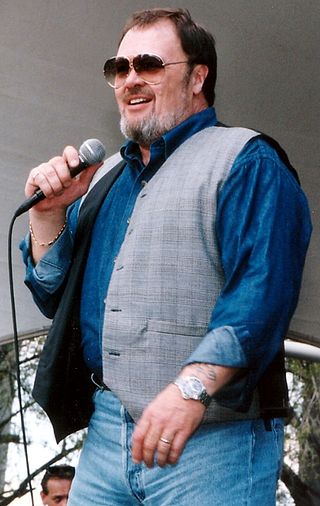
Decca Records is a British record label established in 1929 by Edward Lewis. Its US label was established in late 1934 by Lewis, Jack Kapp and Milton Rackmil, who later became American Decca's president too. In 1937, anticipating Nazi aggression leading to World War II, Lewis sold American Decca, and the link between the UK and US Decca label was broken for several decades. The British label was renowned for its development of recording methods, while the American company developed the concept of cast albums in the musical genre.
RCA Records is an American record label owned by Sony Music Entertainment, a subsidiary of Sony Corporation of America.

Coral Records was a subsidiary of Decca Records that was formed in 1949. Coral released music by Patsy Cline, Buddy Holly, the McGuire Sisters and Teresa Brewer.

MGM Records was a record label founded by the Metro-Goldwyn-Mayer film studio in 1946 for the purpose of releasing soundtrack recordings of their musical films. It transitioned into a pop music label that continued into the 1970s. The company also released soundtrack albums of the music for some of their non-musical films as well, and on rare occasions, cast albums of off-Broadway musicals such as The Fantasticks and the 1954 revival of The Threepenny Opera. In one instance, MGM Records released the highly successful soundtrack album of a film made by another studio, Columbia Pictures's Born Free (1966).

Command Records was a record label founded by Enoch Light in 1959 and, in October that year, was acquired by ABC-Paramount Records. Light produced a majority of the releases in the label's catalog.
Grand Award Records was a pop, jazz, and gospel music record label founded by violinist and conductor Enoch Light in Harrison, New Jersey in 1955.

Checker Records is an inactive record label that was started in 1952 as a subsidiary of Chess Records in Chicago, Illinois. The label was founded by the Chess brothers, Leonard and Phil, who ran the label until they sold it to General Recorded Tape (GRT) in 1969, shortly before Leonard's death.
Riverside Records was an American jazz record company and label. Founded by Orrin Keepnews and Bill Grauer, Jr, under his firm Bill Grauer Productions in 1953, the label played an important role in the jazz record industry for a decade. Riverside headquarters were located in New York City, at 553 West 51st Street.
RPM Records was an American Los Angeles–based record label launched in 1950. This is not the same RPM used by Tony Bennett, nor is it related to labels in the UK and South Africa.

David Clayton-Thomas is a Grammy Award-winning Canadian musician, singer, and songwriter, best known as the lead vocalist of the U. S. band Blood, Sweat & Tears. Clayton-Thomas has been inducted into the Canadian Music Hall of Fame and in 2007 his jazz/rock composition "Spinning Wheel" was enshrined in the Canadian Songwriter's Hall of Fame. In 2010, Clayton-Thomas received his star on Canada's Walk of Fame.
Jubilee Records was an American independent record label, specializing in rhythm and blues and novelty records. It was founded in New York City in 1946 by Herb Abramson. His partner was Jerry Blaine. Blaine bought Abramson's half of the company in 1947, when Abramson went on to co-found Atlantic Records with Ahmet Ertegun. The company name was Jay-Gee Recording Company, a subsidiary of the Cosnat Corporation. Cosnat was a wholesale record distributor.

"Sh-Boom" is an early doo-wop song by the R&B vocal group The Chords. It was written by James Keyes, Claude Feaster, Carl Feaster, Floyd F. McRae, and William Edwards, members of The Chords, and published in 1954. It is sometimes considered the first doo-wop or rock 'n' roll record to reach the top ten on the pop charts, as it was a top-10 hit that year for both the Chords and The Crew-Cuts. In 2004, it was ranked No. 215 on Rolling Stone's "Top 500 Best Songs of All Time".

Enoch Henry Light was an American classically trained violinist, danceband leader, and recording engineer. As the leader of various dance bands that recorded as early as March 1927 and continuing through at least 1940, Light and his band primarily worked in various hotels in New York. For a time in 1928 he also led a band in Paris. In the 1930s Light also studied conducting with the French conductor Maurice Frigara in Paris.

Vann "Piano Man" Walls was an American rhythm and blues piano player, songwriter, studio musician and professional recording artist. He was a long-standing session player for Atlantic Records, appearing on hits by artists including Big Joe Turner, Ruth Brown and The Clovers. Walls performed under a number of different names and is variously credited as Van Walls, Harry Van Walls and Captain Van. He led the Harry Van Walls Orchestra and also performed with Doc Starkes and His Nite Riders and as Le Capitaine Van.
William Everett Justis Jr. was an American pioneer rock and roll musician, composer, and musical arranger, best known for his 1957 Grammy Hall of Fame song, "Raunchy". As a songwriter, he was also often credited as Bill Everette.

Merrilee Rush is an American singer, best known for her recording of the song "Angel of the Morning", a top-10 hit which earned her a Grammy nomination for female vocalist of the year in 1968.
| image = Charlie Christian .jpg

Apollo Records was a record company and label founded in New York City by Hy Siegel and Ted Gottlieb in 1944. A year later it was sold to Ike and Bess Berman. Apollo was known for blues, doo-wop, gospel, jazz, and rock and roll.
Budget albums were low-priced vinyl LPs of popular and classical music released during the 1950s to 1970s consisting either of previously released material or material recorded especially for the line. Prices ranged from as low as 59 U.S. cents to $2.98. In the UK Pickwick Records' Top of the Pops record series, which operated between 1968 and 1985, was the most successful budget album range.

"Rock-A-Beatin' Boogie" is a 1952 song composed by Bill Haley and first recorded by the Esquire Boys in 1952. Bill Haley and the Comets recorded the song in 1955 for Decca. The song was featured in the 1956 movie Rock Around the Clock.












